小学六年级一般过去式语法讲解
- 格式:doc
- 大小:35.50 KB
- 文档页数:2
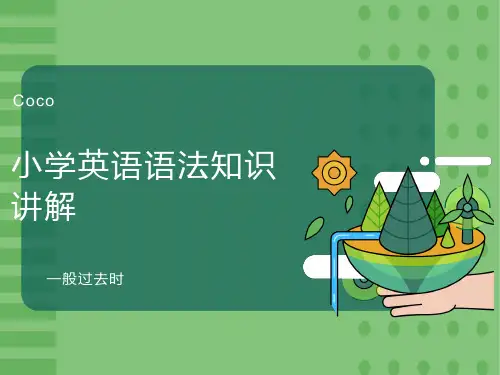
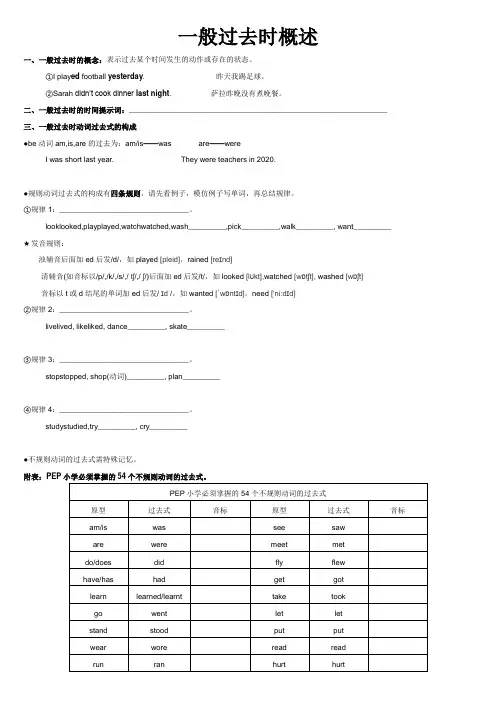
一般过去时概述一、一般过去时的概念:表示过去某个时间发生的动作或存在的状态。
①I play ed football yesterday. 昨天我踢足球。
②Sarah didn’t cook dinner last night. 萨拉昨晚没有煮晚餐。
二、一般过去时的时间提示词:______________________________________________________________三、一般过去时动词过去式的构成●be动词am,is,are的过去为:am/is——was are——wereI was short last year. They were teachers in 2020.●规则动词过去式的构成有四条规则,请先看例子,模仿例子写单词,再总结规律。
①规律1:_______________________________。
looklooked,playplayed,watchwatched,wash_________,pick_________,walk_________, want_________ ★发音规则:浊辅音后面加ed后发/d/,如played [pleid],rained [reɪnd]清辅音(如音标以/p/,/k/,/s/,/ tʃ/,/ʃ/)后面加ed后发/t/,如looked [lʊkt],watched [wɒtʃt], washed [wɒʃt]音标以t或d结尾的单词加ed后发/ɪd /,如wanted [ˈwɒntɪd],need ['ni:dɪd]②规律2:_______________________________。
livelived, likeliked, dance_________, skate_________③规律3:_______________________________。
stopstopped, shop(动词)_________, plan_________④规律4:_______________________________。
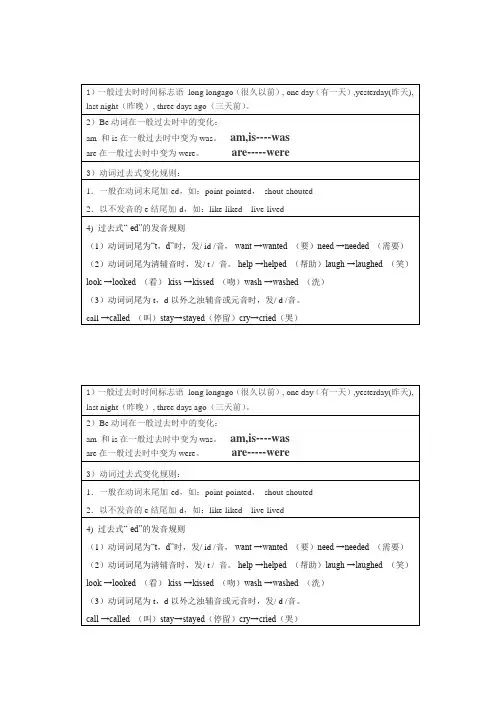
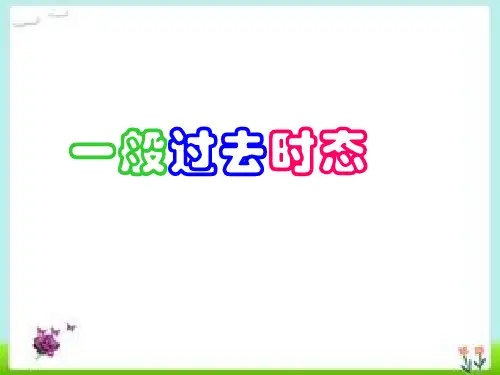
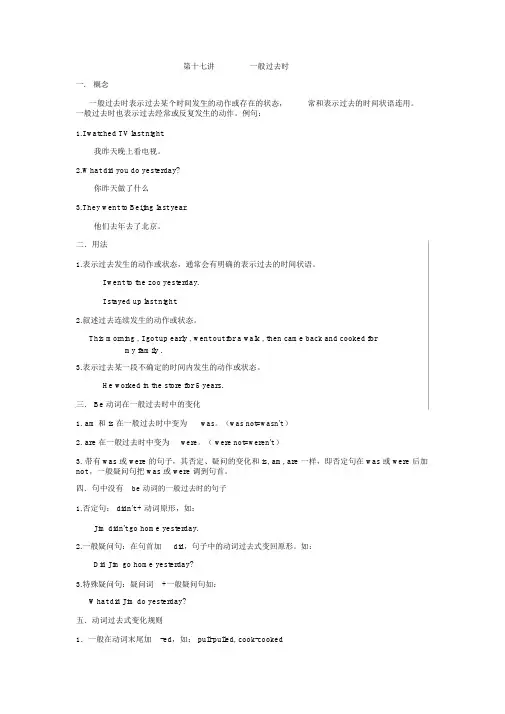
第十七讲一般过去时一.概念一般过去时表示过去某个时间发生的动作或存在的状态,常和表示过去的时间状语连用。
一般过去时也表示过去经常或反复发生的动作。
例句:1.I watched TV last night.我昨天晚上看电视。
2.What did you do yesterday?你昨天做了什么3.They went to Beijing last year.他们去年去了北京。
二.用法1.表示过去发生的动作或状态,通常会有明确的表示过去的时间状语。
I went to the zoo yesterday.I stayed up last night.2.叙述过去连续发生的动作或状态。
This morning , I got up early , went out for a walk , then came back and cooked formy family .3.表示过去某一段不确定的时间内发生的动作或状态。
He worked in the store for 5 years.三. Be 动词在一般过去时中的变化1. am 和 is 在一般过去时中变为was。
(was not=wasn't )2. are 在一般过去时中变为were。
( were not=weren't )3. 带有 was 或 were 的句子,其否定、疑问的变化和 is, am, are 一样,即否定句在 was 或 were 后加not ,一般疑问句把 was 或 were 调到句首。
四.句中没有be 动词的一般过去时的句子1.否定句: didn't + 动词原形,如:Jim didn't go home yesterday.2.一般疑问句:在句首加did,句子中的动词过去式变回原形。
如:Did Jim go home yesterday?3.特殊疑问句:疑问词+一般疑问句如:What did Jim do yesterday?五.动词过去式变化规则1.一般在动词末尾加-ed,如: pull-pulled, cook-cooked2.结尾是 e 加d,如:taste-tasted3.末尾是辅音字母加一个元音字母和一个辅音字母的重读闭音节,应双写末尾的辅音字母,再加 -ed,如: stop-stopped4.以“辅音字母+y ”结尾的,变y 为 i,再加 -ed,如:study-studied六.真题再现() 1. The boy the tree last week.A. is wateringB. watersC. watered2. I _____(see) his name in the newspaper yesterday.因为句中出现了表示过去的时间状语last week 和 yesterday ,所以正确答案分别为: 1. C 2.saw精点精练一、用动词的适当形式填空。

小学一般过去时教学课件2023-10-26contents •一般过去时的定义和特点•一般过去时的基本用法•一般过去时的常见形式•一般过去时的句型和用法•一般过去时的特殊用法及注意事项目录01一般过去时的定义和特点一般过去时是一种动词时态,表示过去某个时间发生的动作或状态。
定义一般过去时由动词的过去式构成,规则动词的过去式是在动词后加上-ed,例如walk→walked,play→played。
不规则动词则需要单独记忆,例如go→went,do→did。
构成时间指向一般过去时的时间指向是过去,它描述的是过去某个时间发生的动作或状态。
语法结构一般过去时的语法结构是动词的过去式,通过加-ed来构成。
表达方式一般过去时可以用在陈述句、疑问句和否定句中,例如I walkedto school yesterday(我昨天走路去学校)。
02一般过去时的基本用法1表示过去的动作或状态23描述过去发生的动作或状态,例如:昨天我去了公园。
描述已经完成的动作或状态,例如:我已经吃过午饭了。
描述持续到过去的动作或状态,例如:他去年住在北京。
描述过去某人在某事上的经历或经验,例如:我去年去过长城。
描述过去的感受或体验,例如:他昨天很开心。
描述过去对某事物的看法或经历,例如:他以前喜欢看动画片。
表示过去的经历或经验表示过去的比较或对比02描述过去两个时间之间的比较或对比,例如:昨天比前天热。
03描述过去两个地点之间的比较或对比,例如:北京比上海繁华。
03一般过去时的常见形式主语+was/werebe动词的一般过去时形式肯定句形式主语+was not/were not否定句形式Was/Were+主语一般疑问句形式do/does的一般过去时形式肯定句形式:主语+did否定句形式:主语+did not一般疑问句形式:Did+主语肯定句形式:主语+had否定句形式:主语+had not一般疑问句形式:Had+主语have/has的一般过去时形式04一般过去时的句型和用法总结词表示“存在”或“位置”。
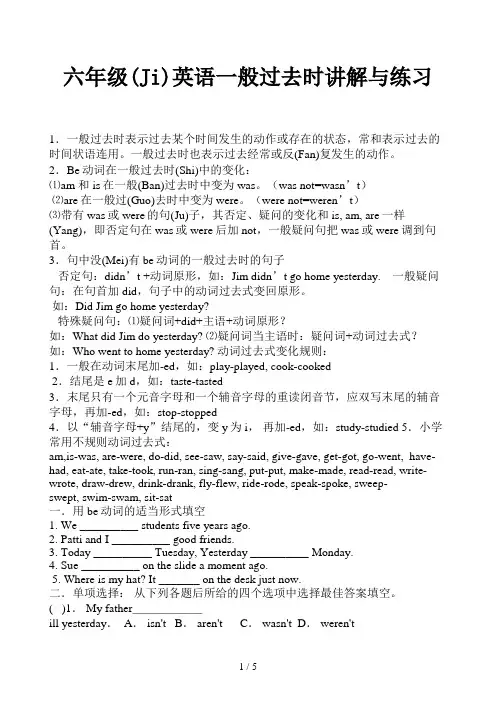
六年级(Ji)英语一般过去时讲解与练习1.一般过去时表示过去某个时间发生的动作或存在的状态,常和表示过去的时间状语连用。
一般过去时也表示过去经常或反(Fan)复发生的动作。
2.Be动词在一般过去时(Shi)中的变化:⑴am 和is在一般(Ban)过去时中变为was。
(was not=wasn’t)⑵are在一般过(Guo)去时中变为were。
(were not=weren’t)⑶带有was或were的句(Ju)子,其否定、疑问的变化和is, am, are一样(Yang),即否定句在was或were后加not,一般疑问句把was或were调到句首。
3.句中没(Mei)有be动词的一般过去时的句子否定句:didn’t +动词原形,如:Jim didn’t go home yesterday. 一般疑问句:在句首加did,句子中的动词过去式变回原形。
如:Did Jim go home yesterday?特殊疑问句:⑴疑问词+did+主语+动词原形?如:What did Jim do yesterday? ⑵疑问词当主语时:疑问词+动词过去式?如:Who went to home yesterday? 动词过去式变化规则:1.一般在动词末尾加-ed,如:play-played, cook-cooked2.结尾是e加d,如:taste-tasted3.末尾只有一个元音字母和一个辅音字母的重读闭音节,应双写末尾的辅音字母,再加-ed,如:stop-stopped4.以“辅音字母+y”结尾的,变y为i,再加-ed,如:study-studied 5.小学常用不规则动词过去式:am,is-was, are-were, do-did, see-saw, say-said, give-gave, get-got, go-went, have-had, eat-ate, take-took, run-ran, sing-sang, put-put, make-made, read-read, write-wrote, draw-drew, drink-drank, fly-flew, ride-rode, speak-spoke, sweep-swept, swim-swam, sit-sat一.用be动词的适当形式填空1. We __________ students five years ago.2. Patti and I __________ good friends.3. Today __________ Tuesday, Yesterday __________ Monday.4. Sue __________ on the slide a moment ago.5. Where is my hat? It _______ on the desk just now.二.单项选择:从下列各题后所给的四个选项中选择最佳答案填空。
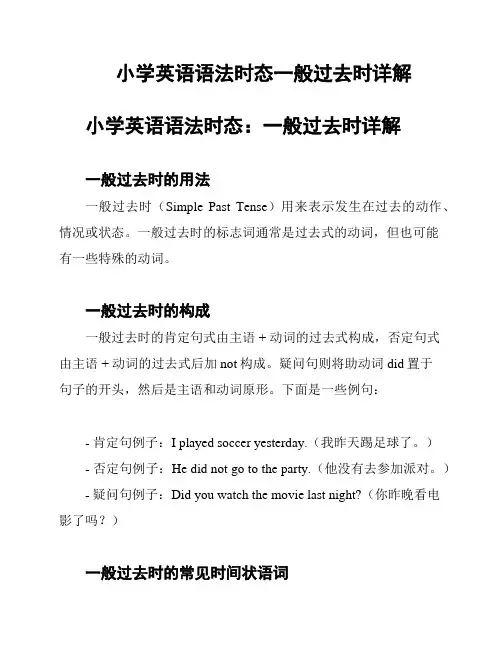
小学英语语法时态一般过去时详解小学英语语法时态:一般过去时详解一般过去时的用法一般过去时(Simple Past Tense)用来表示发生在过去的动作、情况或状态。
一般过去时的标志词通常是过去式的动词,但也可能有一些特殊的动词。
一般过去时的构成一般过去时的肯定句式由主语 + 动词的过去式构成,否定句式由主语 + 动词的过去式后加not构成。
疑问句则将助动词did置于句子的开头,然后是主语和动词原形。
下面是一些例句:- 肯定句例子:I played soccer yesterday.(我昨天踢足球了。
)- 否定句例子:He did not go to the party.(他没有去参加派对。
)- 疑问句例子:Did you watch the movie last night?(你昨晚看电影了吗?)一般过去时的常见时间状语词一般过去时通常会和一些时间状语词一起使用,以明确动作发生的具体时间。
以下是一些常见的时间状语词:- yesterday(昨天)- last week(上周)- two days ago(两天前)- in 1998(在1998年)一般过去时的特殊用法一般过去时有一些特殊的用法需要注意:1. 表示过去经常性的动作或惯。
例如:When I was young, I played soccer every day.(当我年轻时,我每天都踢足球。
)2. 表示过去事实或真理。
例如:The earth revolved around the sun.(地球绕太阳转。
)总结一般过去时用来描述发生在过去的动作、情况或状态。
它的构成简单,使用过去式的动词作为标志词。
通过加入时间状语词,可以更明确地指出动作发生的具体时间。
同时,一般过去时还有一些特殊的用法,需要灵活运用。
>注意:本文内容仅供参考,具体使用时请根据实际情况和教材要求进行调整。
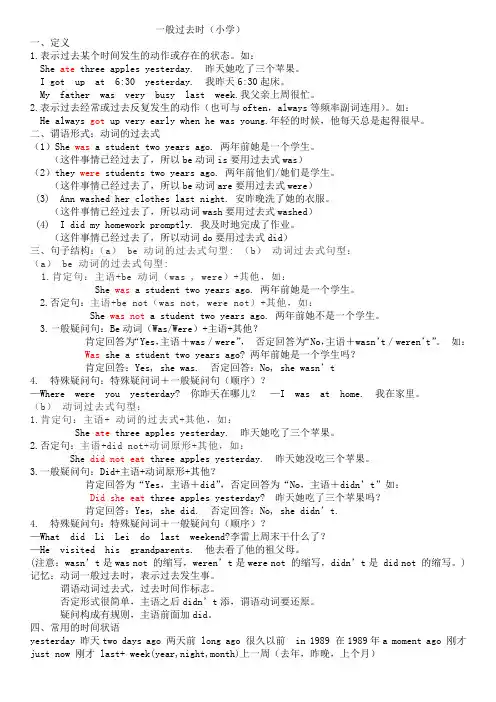
一般过去时(小学)一、定义1.表示过去某个时间发生的动作或存在的状态。
如:She ate three apples yesterday. 昨天她吃了三个苹果。
I got up at 6:30 yesterday. 我昨天6:30起床。
My father was very busy last week.我父亲上周很忙。
2.表示过去经常或过去反复发生的动作(也可与often,always等频率副词连用)。
如:He always got up very early when he was young.年轻的时候,他每天总是起得很早。
二、谓语形式:动词的过去式(1)She was a student two years ago. 两年前她是一个学生。
(这件事情已经过去了,所以be动词is要用过去式was)(2)they were students two years ago. 两年前他们/她们是学生。
(这件事情已经过去了,所以be动词are要用过去式were)(3) Ann washed her clothes last night. 安昨晚洗了她的衣服。
(这件事情已经过去了,所以动词wash要用过去式washed)(4) I did my homework promptly. 我及时地完成了作业。
(这件事情已经过去了,所以动词do要用过去式did)三、句子结构:(a) be 动词的过去式句型: (b)动词过去式句型:(a) be 动词的过去式句型:1.肯定句:主语+be 动词(was , were)+其他,如:She was a student two years ago. 两年前她是一个学生。
2.否定句:主语+be not(was not, were not)+其他,如:She was not a student two years ago. 两年前她不是一个学生。
3.一般疑问句:Be动词(Was/Were)+主语+其他?肯定回答为“Yes,主语+was/were”,否定回答为“No,主语+wasn’t/weren’t”。
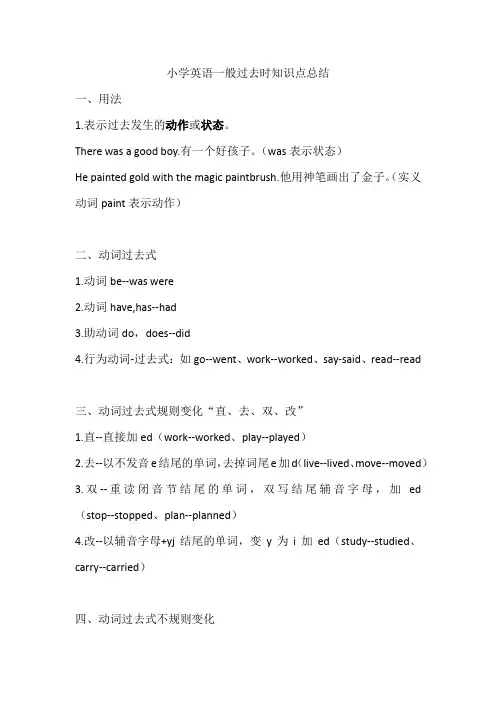
小学英语一般过去时知识点总结一、用法1.表示过去发生的动作或状态。
There was a good boy.有一个好孩子。
(was表示状态)He painted gold with the magic paintbrush.他用神笔画出了金子。
(实义动词paint表示动作)二、动词过去式1.动词be--was were2.动词have,has--had3.助动词do,does--did4.行为动词-过去式:如go--went、work--worked、say-said、read--read三、动词过去式规则变化“直、去、双、改”1.直--直接加ed(work--worked、play--played)2.去--以不发音e结尾的单词,去掉词尾e加d(live--lived、move--moved)3.双--重读闭音节结尾的单词,双写结尾辅音字母,加ed (stop--stopped、plan--planned)4.改--以辅音字母+yj结尾的单词,变y为i加ed(study--studied、carry--carried)四、动词过去式不规则变化1.中间有双e,去e尾加t(保持keep--kept)2.结尾d要变成t(建筑build--built)3.遇见i来,a来替(坐sit--sat)4.若是买来想打仗,战甲ought要换上(买buy--bought、带来bring--brought)5.教书抓住刷流氓,制服aught来帮忙(教teach--taught、catch--taught)6.ow/aw凑热闹,变成ew最时尚(知道know--knew、生长grow--grew)7.“放、读、切、让”过去原形都一样(放put--put、切cut--cut、让let--let、读read/ri:d/--read/red/)五、过去式+ed的发音“清清浊浊,元后浊,td后面读id”1.在以清辅音结尾的规则动词后,ed读作/t/(worked//)2.在以浊辅音或元音结尾的规则动词后,ed读作/d/3.在以/t/或/d/结尾的规则动词后,ed读作//六、与过去时连用的时间词1.ago家族(两分钟之前two minutes ago、五年之前five years ago、很久很久之前long long ago)st家族(上周last week、上个月last month、去年冬天last winter)3.yesterday家族(昨天早晨yesterday morning、前天the day before yesterday)4.that家族(那天早上that morning、那天that day、那年that year)5.其他(刚才just now、那些天in those days、在1980年in 1980、那是at that time、以前once upon a time)七、句式变化1、肯定句变否定句:+not表动作(无be,借助did,did+ not)表状态(be+not)2、肯定句变一般疑问句:一挪二改表动作(一挪:有be挪be,没be借did,先借再挪;二改:人称一变二,句号变问号)表状态(一挪:be挪到句首;二改:人称一变二,句号变问号)3、对划线部分提问:一找二挪三改表动作(一找:找到划线部分对应的疑问词,将疑问词放到句首;二挪:有be动词的挪be,没有be动词的借助did,先挪再借,挪到疑问词后,其他照抄;三改:人称一变二,句号变问号)表状态(一找:找到划线部分对应的疑问词,将疑问词放到句首;二挪:be挪到疑问词后,其他部分照抄;三改:人称一变二,句号变问号。
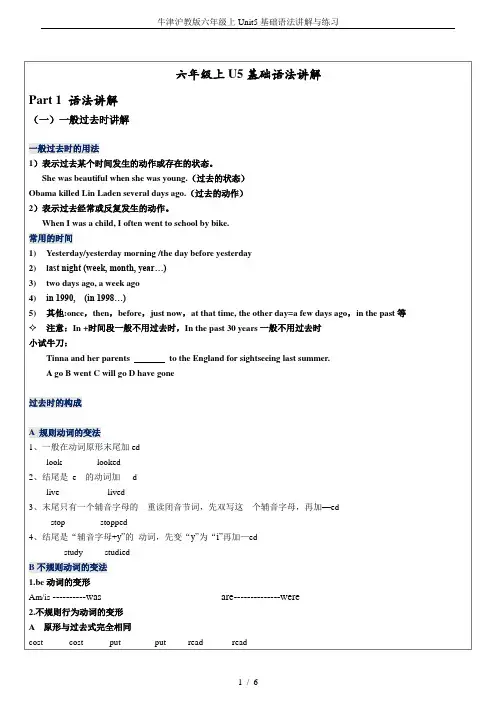
六年级上U5基础语法讲解Part 1 语法讲解(一)一般过去时讲解一般过去时的用法1)表示过去某个时间发生的动作或存在的状态。
She was beautiful when she was young.(过去的状态)Obama killed Lin Laden several days ago.(过去的动作)2)表示过去经常或反复发生的动作。
When I was a child, I often went to school by bike.常用的时间1)Yesterday/yesterday morning /the day before yesterday2)l ast night (week, month, year…)3)two days ago, a week ago4)in 1990, (in 1998…)5)其他:once,then,before,just now,at that time, the other day=a few days ago,in the past等 注意:In +时间段一般不用过去时,In the past 30 years一般不用过去时小试牛刀:Tinna and her parents to the England for sightseeing last summer.A goB wentC will goD have gone过去时的构成A 规则动词的变法1、一般在动词原形末尾加edlook looked2、结尾是e 的动词加-- dlive lived3、末尾只有一个辅音字母的重读闭音节词,先双写这个辅音字母,再加—edstop stopped4、结尾是“辅音字母+y”的动词,先变“y”为“i”再加—edstudy studiedB不规则动词的变法1.be动词的变形Am/is ----------was are--------------were2.不规则行为动词的变形A 原形与过去式完全相同cost---------cost put -----------put read----------readLet ---------let set------------set hit -----------hitB动词原形中的e变为oSell----------sold tell-------------told get------------gotC动词原形中的d变为tSpend----------spent lend---------lent send-------sentD动词原形中的ee去掉e,词尾加tFeel---------felt keep ----------kept sleep------slept这些规律没写全,希望学生课后找出其他规律注意特殊动词的变形说谎lie, lied躺lie, lay,下蛋,放置lay, laidE.g. A hen an egg; a boypicked it up , and it in the bag. Then he to his mother. There was no egg.一般过去时的基本句型1.系动词be的过去时.am(is) →was are →were陈述句:He was at home yesterday.否定句:He wasn’t at home yesterday.疑问句:Was he at home yesterday?Yes ,he was./No ,he wasn’t.2行为动词的一般过去时:陈述句主语+v-ed+其他I ate 100 eggs.否定句主语+did not /didn’t+v+其他I did not/didn’t eat 100 eggs.一般疑问句Did +主语+v+其他Did you eat 100 eggs?Yes, I did. /No,I didn’t.特殊疑问句疑问疑问词+did +主语+其他What did you eat?I ate 100 eggs练习1 写出所给词的过去式go _______ enjoy _______ buy _______ sit _______get _______ walk _______ take _______ dance ______write _______ run ______ swim _______ find _______begin _______ eat _______ play _______ study _______do _________ drink ____ sing ________ sleep_______2. 所给动词适当形式填空1. Tom and Mary ___________ (come) to China last month.2. Mike _________________(not go) to bed until 12 o'clock last night. So he ______ (get) up late.3. Mary __________ (read) English yesterday morning.(二)一般将来时讲解回顾定义:表示将来某一个时间将要发生的动作或存在的状态,也表示将来经常或重复发生的动作.一般将来时的标志:tomorrow(明天),the day after tomorrow(后天)next year(明年)next month(下一个月)next week(下一个星期)一般将来时的构成:1.主语+be(am,is,are) going to+V原形+......2.主语+will+V原形+.....3.一般疑问句:(1)be动词+主语+going to+动词原形+....(2).Will/+主语+动词原形+...4.特殊疑问句:(1).What(Where,How...)+be(am,is,are)+主语+going to+V原形+...?(2). What(When,Where,How...)+will+主语+V原形+...?注意:有些词如:go(去),come(来),leave(离开),start(开始)用现在进行时表示将来时.eg: (1)She is coming here tomorrow.(2) I am leaving this Friday.注意:"Be going to+动词原形+..." 表示一个事先考虑好的意图,,相当于文中的"打算,计划,准备"练习用动词的正确形式填空,每空一词。
英语一般过去时定义表示在的过去某个时间里所发生的动作或存在的状态。
构成一般过去时的句式变化1.陈述句:主语+动词过去式+其他I saw the rianbow yesterday.我昨天看到了彩虹。
They went to he park last Sunday.上周日他们去了公园。
Ben got up at six this morning.本今天早上是六点起床的。
2.一般疑问句1)将be动词提到句首陈述句:It was an egg yesterday.它昨天还是一个蛋。
一般疑问句:Was it an egg yesterday?它昨天还是一个蛋吗?陈述句:They were at school just now.他们刚才还在学校。
一般疑问句:Were they at school just now?他们刚才还在学校吗?Linda老师的小提醒主语是第一人称和第二人称的句子,其过去时变化时,要注意be动词的变化。
一般疑问句:Were you at home last night?你昨天晚上在家吗?肯定回答:Yes,I was.否定回答:No,I wasn't.2)用助动词did陈述句:I did my homework at school,我在学校做了作业。
一般疑问句:Did you do your homework at school?你在学校做作业了吗?陈述句:They played basketball just now.他们刚才打了篮球。
一般疑问句:Did they play basketball just now?他们刚才打篮球了吗?小提醒由过去时态的陈述句变一般疑问句时,变化技巧上可以用拆分法,将动词过去式拆分为did+动词原形,然后将did提到句首,这样就不容易发生错误。
He slept a whole day.他睡了一整天。
第一步:先将slept拆分为did sleep第二步:将did提到句首变成:Did he sleep a whole day?他睡了一整天吗?3.否定句1)在be动词后面+not陈述句:I was a teacher twenty years ago.我20年前是一名老师。
人教版(新起点)-英语-打印版一般过去时一、结构:① be动词(is, am, are)→ was/were 主语+ 谓语②实义动词→相应的动词过去式含义:①表示过去的事实或状态。
例:He was very busy an hour ago. 他在过去的一小时非常忙碌。
I was eight years old last year. 我去年8岁。
②表示在过去某个时间内所作的事情,常和表示过去的时间状语连用。
例:She bought many books yesterday. 昨天她买了很多书。
I played table tennis with my friend last Monday. 上周一我和一个朋友打了乒乓球。
表示过去的时间状语,有:yesterday, last week, last year, two days ago, ...二、动词的过去式动词有规则动词和不规则动词之分。
规则动词的过去式都是以-ed结尾,而不规则动词的过去式是没有规则。
1. 一般情况下,在动词原形后直接加ed。
如:wanted, played。
2. 以不发音的字母e结尾的动词,直接加d。
如:hoped, lived。
3. 重读闭音节单词需双写最后一个辅音字母,再加ed。
如:stopped, shipped。
4. 以辅音字母+y结尾的动词变y为i,再加ed。
如:studied,worried。
5. 有些动词不符合上面的规则,需要特殊记忆。
如:am(is)-was, are-were, go-went, eat-ate, swim-swam, buy-bought, see-saw, lose-lost teach-taught, bring-brought, think-thought, fall-fell, hurt-hurt, break-broke, win-won…。
一般过去时讲解一. 概念一般过去时表示过去某一时间发生的动作或存在的状态。
常和yesterday, last week(year), three days(weeks) ago,in 2003等时间状语连用。
二.一般过去时有下面三种用法:1.表示过去的动作或状态:I bought the hat yesterday.昨天我买了这顶帽子。
He was at school last Monday.上星期一他在上学。
2.表示过去的习惯动作:When he was at school, he wrote a dairy every day.他上学时,每天写一篇日记。
I used to get up early.我以前习惯早起。
注:"used to+动词原形"表示过去某一段时间内有规律的习惯。
3.表示过去发生的一连串的动作:The students got up early in the morning, did their morning exercise, fetched water, swept the floor and then studied English.学生们一早起来,做早操,打水,扫地,然后学英语。
三. 构成(1)主语+be动词(was,were)+其它。
当主语为第一、三人称单数时,be动词用was,主语为其它人称时,be 动词一律用were。
如:I(He, She) was in Grade 5 last year.They were students two years ago.(2) 主语+行为动词过去式(无人称和数的变化)。
如:We played football yesterday. Mr Li went to Shanghai last Sunday.3.变化形式:A.一般在动词词尾加ed。
例如:play—played clean—cleaned visit—visitedB.动词末尾字母是e的,在e后直接加d。
2023年小升初语法总复习(三)一般过去时1.一般过去时的定义:表示过去某个时间发生的动作或存在的状态,也表示过去经常或反复发生的动作,常和表示过去的时间状语连用。
2.一般过去时的句型结构:(1)含有be动词的一般过去时。
①am和is在一般过去时中变为was。
(was not=wasn’t)①are在一般过去时中变为were。
(were not=weren’t)①带有was或were的句子,其否定句、一般疑问句的变化和一般现在时一样,即否定句在was或were后加not,一般疑问句把was或were提到句首。
(2)含有行为动词的一般过去时。
①否定句:didn’t+动词原形,如:Mary didn’t go home yesterday.玛丽昨天没有回家。
①一般疑问句:在句首加Did,句子中的动词过去式变回原形。
如:Did Mary go home yesterday?昨天玛丽回家了吗?①特殊疑问句:特殊疑问词+一般疑问句?如:Mary went home yesterday.(对画线部分提问)When did Mary go home?3.动词过去式的变化规则:(1)一般在动词末词尾加-ed。
如:cook-cooked, play-played。
(2)以不发音的e结尾的单词加-d。
如:taste-tasted。
(3)以重度闭音节结尾,且词尾只有一个辅音字母,则双写这个辅音字母,再加-ed。
如:stop-stopped。
(4)以“辅音字母+y”结尾的单词,变y为i,再加-ed。
如:study-studied。
(5)不规则动词的过去式。
如:do-did, go-went。
【即时演练】一、写出下列动词的过去式。
1.is/am2.fly3.plant4.are5.go6.make7.taste 8.throw 9.ask10.buy 11.bring 12.draw13.kick 14.dance 15.catch16.play 17.drink 18.put二、用所给动词的适当形式填空。
一般过去时知识点大全小学一般过去时是英语中最常用的时态之一,用来表示过去发生或存在的动作、状态或习惯。
在小学阶段,学生需要掌握一般过去时的基本用法和规则,以便正确运用。
下面是一般过去时知识点的详细介绍:1. 一般过去时的构成:一般过去时是通过在动词原形后面直接加上“-ed”来构成的。
例如:play→played,paint→painted。
2. 一般过去时的肯定句:一般过去时的肯定句的结构是:主语 + 动词过去式 + 其他。
例如:I played soccer with my friends yesterday.我昨天和我的朋友们踢足球。
3. 一般过去时的否定句:一般过去时的否定句的结构是:主语 + did not + 动词原形 + 其他。
例如:We did not watch a movie last night.我们昨晚没看电影。
4. 一般过去时的疑问句:一般过去时的疑问句的结构是:Did + 主语 + 动词原形 + 其他?例如:Did you eat breakfast this morning?你今天早上吃早饭了吗?5. 一般过去时中的时间状语词:一般过去时通常与过去的时间状语词连用,表示动作或事件发生的具体时间。
例如:yesterday(昨天)、last week(上周)、two days ago(两天前)等。
6. 一般过去时中的特殊动词:一般过去时中有一些特殊的动词形式需要注意:- be动词的过去式形式是was(单数第一人称和单数第三人称)和were(其他人称和复数形式)。
- do动词的过去式形式是did。
7. 一般过去时中的规则动词和不规则动词:在一般过去时中,大部分动词都是按照规则进行变化的,即直接在动词原形后加上“-ed”。
而一些常见的动词则有自己的过去式形式,需要记住,其中包括go(went)、see(saw)、eat(ate)等。
8. 一般过去时与现在时态的对比:一般过去时表示的是过去发生的动作或状态,与现在时态形成对比。
表示在过去某个时间里所发生的动作或存在的状态。
通常在句子里找到表示过去时间的词或词组。
如:yesterday, yesterday morning, yesterday afternoon, yesterday evening, the day before yesterday, last night, last week, last month, last year, a moment ago, just now, two days ago, a week ago, in 1990等。
如:I went to bed at eleven last night. 昨晚我11:00睡觉。
二动词过去式的构成规律(一)规则动词的过去式1,一般情况下+,在动词原形后面加-ed;Look--- looked play----played start--- started visit—visited2, 以不发音e结尾的动词,在词尾直接加-d;Live—lived use---used3, 以“辅音字母+y”结尾的动词,先将y 改成i,再加–ed;Study---studied try—tried fly---flied4,以重读闭音节(即辅音+元音+辅音)或 r 音节结尾,末尾只有一个辅音字母的动词,要先双写这个辅音字母后,再加–ed。
Stop---stopped plan---planned preferred(二)不规则动词的过去式1 改变动词中的元音;Begin--- began drink---drank come---came eat---ateGrow---grew run---ran know---knew win---won speak---spokeTake ---took write ---wrote get---got2 变词尾的-d 为-tBuild---built lend---lent send---sent spend--spent bend--bent3 与动词原形一样;Cut---cut put---put cost----cost hurt---hurt shut---shut4 变-ay 为—aid(少数动词)Say---said pay---paid lay---laid5 采用不同词根;Sell--- sold teach----taught buy----bought6 其他Am/is ---was are---were have/has--- had do---did二加–ed 后的读音方法1 ed加在清辅音后面读/t/Finished/-t/ help /-t/ asked/-t/2 ed 加在浊辅音或元音结尾的,读/d/Played/-d/ lived/-d/ enjoyed/-d/3 ed 加在/t/或/d/后面,读/id/Wanted /-tid/ needed/-did/ visited /-tid/过去时练习:写出下列动词的过去式Is\am______ fly___ plant_____ are_____ drink_____Play ______ go____ make______ does_____ dance_____Worry______ ask____ taste_______ eat_____ draw_____Put_____ throw______ kick_______ pass_____ do______用所给动词的适当形式填空1 We_____ (live) in Japan last year.2 Susan_____(stop) the car on the street yesterday.3 My mother____(clean) my room and I _____( study) for the English test last Sunday.4 What____ you_____(do) last night5 On Saturday morning I ____(play) football二用括号内所给动词的适当形式填空(1)May_____(finish) her homework very late yesterday evening.(2)Han Mei_____(bring) her pet to the park that day.(3)His father______(buy) a new computer for him last week(4)Miss Du______ (walk) to work every day last term.(5)We____(move) to Shenyang 8 years ago.(6)_____ you _________(have) bread for breakfast this morning(7)She_______(give) me a nice present last night.(8)The police______(stop) the car and_____(catch) the thief (小偷) just now.(9)Tom ____(carry)water for the old man last Saturday.(10)Uncle Wang______(come)into the room and______(find) something to eat.(11)Lily______(study)in the classroom for two hours and then ____(leave).(12)Jimmy______(do) a lot today. He______(go) shopping and _____(cook)supper.(13)We_____(go) to the cinema last night. The film_____(be)very good.(14)What time ______you________(get) to school this morning(一)一般过去时的一般疑问句1.把 was, were放在句首,其余位置不变。
由Was…引导的一般疑问句,肯定答为:Yes,… was. 否定回答为:No,…wasn’t 由Were…引导的一般疑问句,肯定回答为:Yes,…were.否定回答为:No,…weren’t.如:(1)I was born in Shanghai. ----Were you born in Shanghai---Yes, I was.(肯定回答) ----No, I wasn’t(否定回答)(2)They were in Li Yan’s home last night. ----Were they inLi Yan’s home last night--Yes, they were.(肯定回答) --No, they weren’t(否定回答)2.在行为动词的句子中,要用助动词did 来引导,其余的语序不变。
要注意的是,要把行为动词的过去式改为原形。
肯定回答为:Yes,…did 否定No,…didn’t.如:John played computer games last John play computer games last nightYes, he did. No,he didn’t(二)一般过去时的否定句1 在表示过去存在的状态的句子中,相接在was, were的后面加上not。
如:(1)H e was in the park the day before yesterday.He was not in the park the day before yesterday.(2) We were busy last week.We were not busy last week.2 在表示过去的时间发生的动作的句子中,要在行为动词的前面加助动词didn’t. 然后把过去式的行为动词改为动词原形。
即:didn’t+ 动词原形。
如(1) She played the violin last night.She didn’t play the violin last night.(2) They swam in the lake yesterday.They didn’t swim in the lake yesterday.(三) 一般过去式的特殊疑问句did… (主要是询问过去发生了什么事情,注意要把过去式改为动原形。
)We ate Chinese food last night.What did we eat last night2.Where did (主要是询问过去事情发生的地方)They sang and dance in the music room yesterday morning.Where did they sing and dance yesterday morning3.Who +动词过去式… (主要是询问过去事情发生的人物)Mike and Tom climbed mountains last weekend.Who climbed mountains last weekend四句子结构1 在表示某个时间里存在的状态的句子,系动词用过去式was,were 构成。
如:(1)I was at home yesterday. 昨天我在家。
(2)W e were in the gym just now. 刚才我们在体育馆、2 在表示过去某个时间里发生的动作,用动词的过去式构成。
如:I visited my uncle yesterday. 昨天我拜访了我的叔叔。
3 各种句式(1)一般过去时的肯定陈述句:主语 + 动词过去式 + 宾语或表语。
He worked in Shanghai ten years ago.(2)一般过去时的否定句:a. 主语 + didn’t + 动词原形 + 宾语。
(did+not=didn’t)He didn’t do morning exercises yesterday.b.主语 + wasn’t/weren’t + 表语。
(was+not=wasn’t were+not=weren’t)(3)一般过去时的一般疑问句:a. Did + 主语 + 动词原形 + 宾语Did you study English in `1990b. Was/Were + 主语 + 表语Was he a pupil five years ago(4) 一般过去时的特殊疑问句:a 特殊疑问词 + did + 主语 + 动词原形 +宾语Where did your parents live five years agoWhat did you do last Sundayb 特殊疑问词 + were/ was + 表语Who was at the zoo yesterday。